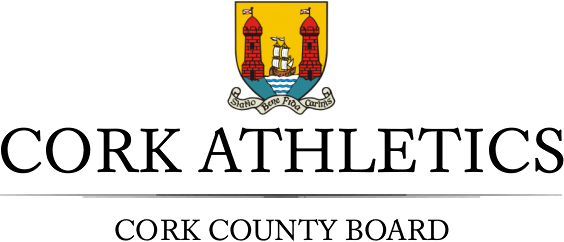

CIT Track Re-Opening on Monday Week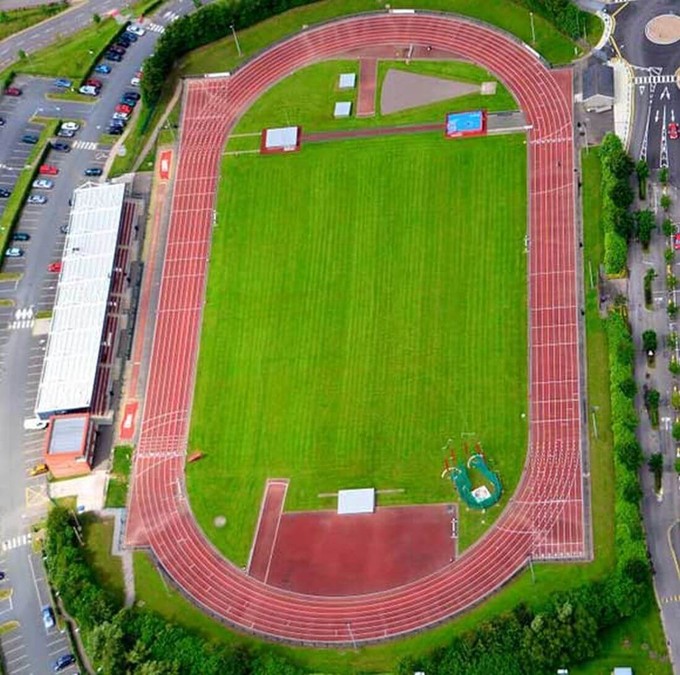 Aerial view of CIT Track
Aerial view of CIT Track
In a welcome move, CIT Management have released a statement saying that they are to re-open the track facility from Monday June 29th, “to coincide with Phase 3 of the Guidelines as set down by Government”.
However there are several restrictions.
The track will initially be open only to CARDED and Elite International athletes only (Athletics Ireland High Performance Group), and MUST be booked in advance through a CIT booking system. The system is being formulated at present.
The track will then opened up, on a phased basis, to existing user clubs, after the intial opening has been reviewed. In the meantime, CIT Sports Dept will be in direct contact with existing user clubs, about matters relating to their club's usage of the track.
[While not decided yet, it is envisaged that all users will be required to show evidence of their Athletics Ireland membership at the gate (Probably in the form of a printout of their AAI Registration) ... But the precise details have yet to be decided)]
In addition there is a limit of 15 persons, in line with current HSE Guidelines, on the track at any time, including coaches and other personnel.
CIT will have a person on duty to manage access and monitor numbers.
CIT have also beefed up security at the track, in recent weeks, repairing damage in the perimeter fencing, and ensuring that the track is locked at all times.
The system is extremely user friendly, mobile phone compatible, and an individual registered Athletics Ireland Club member can book places for up to three other members at any time, without having to input the Athletics Ireland membership numbers for the other three members.
Athletics Ireland Online Reservation System
UCC continue to prepare the track facility, along with a new user management system, and hope to reopen their track over the summer months. (see Covid 19 - Return to Sport Expert Group Release - June 6th 2020)
Related Articles
Covid 19 - Athletics Ireland FAQs re Phase 2 - June 12th 2020
Covid 19 - Return to Sport Expert Group Release - June 6th 2020
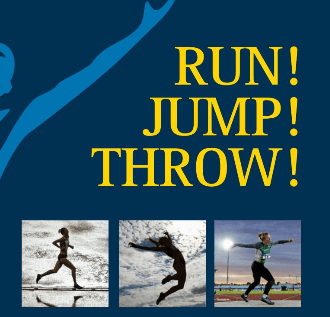
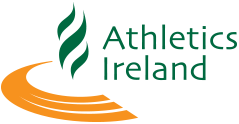
Athletics Ireland are hosting a Run Jump Throw Workshop/Webinar, at 7:30pm, on Thursday June 11th 2020
Athletics Ireland RDO's Lilly-Ann O’Hora, Gerard O’Donnell and Grace Lynch will be covering Hurdles and Endurance, with approx. 45 mins spent on each event. Time will also be given for a Q&A session.
The Run Jump Throw is an introductory level workshop, and is suitable for novice/beginner coaches.
Coaches can register by emailing their own details to This email address is being protected from spambots. You need JavaScript enabled to view it., who will then send on the Zoom details prior to the workshop tomorrow.
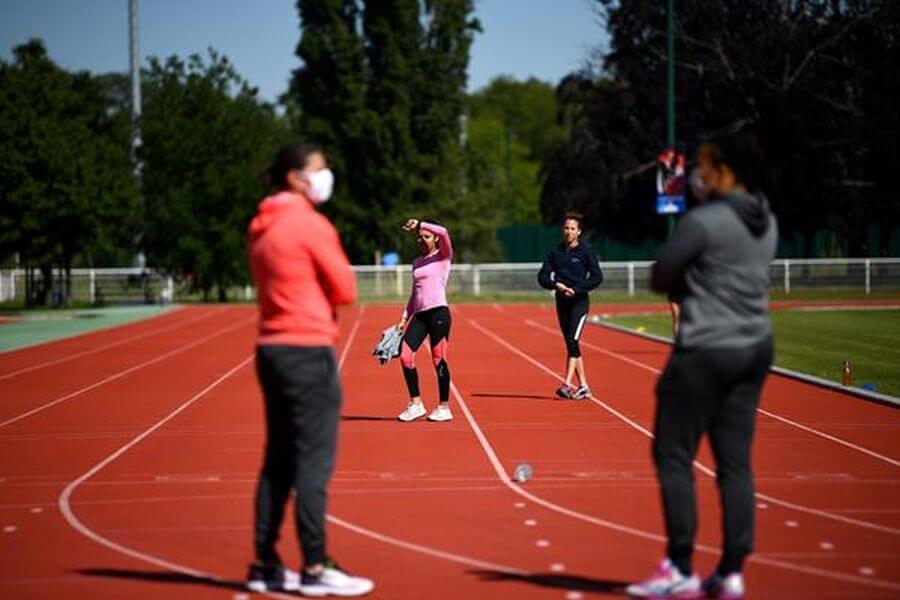 Photo: Getty Images - Post COVID-19 Lockdown scene Institute of Sport, Paris
Photo: Getty Images - Post COVID-19 Lockdown scene Institute of Sport, Paris
Expert Group Statement on Return to Sport Guidance for Outdoor Sports and Fitness
Recognising that organised sports and fitness activities are permitted in outdoor settings for groups of up to 15 people from next Monday, the Expert Group on Return to Sport would advise organisers to consider the following guidance. This guidance should not be considered exhaustive, and organisers are advised to consult other official sources, in particular the advice published by the HSE.
• In advance of the activity, participants should be asked to travel to the activity venue alone or with members of the same household. Sharing transport is not advised in this Phase of the Roadmap.
• Encourage participants not to congregate at the beginning or end of the activity. Ask participants to arrive as close as possible to the activity start time, or to wait in their cars until the activity begins.
• Participants should be asked to bring their own water bottles, towels and where possible personal equipment, and instructed not to share these with others. Personal equipment should only be shared with people from the same household.
• Participants should be asked to wash hands on arrival, if possible, or to use hand sanitiser. If it is not possible to provide hand sanitiser at your location, participants should be asked to bring their own hand sanitiser with them.
• Individual equipment provided to participants should be cleaned and sanitised before and after each activity session. It is recommended that time is scheduled between sessions to enable thorough cleaning and sanitisation to be conducted.
• Sharing of equipment should be avoided wherever possible, as it is generally not permitted in this Phase of the Roadmap. If absolutely necessary, equipment should be cleaned and sanitised between use.
• Participants should be spaced appropriately to maintain a minimum 2 metre physical distancing throughout the activity. Depending on the nature of the activity, it may be necessary to leave more space between participants.
• Participants should be encouraged to adopt good respiratory hygiene, covering their nose and mouth when they cough or sneeze, and using a tissue which is immediately disposed of. Further guidance on hygiene and social distancing is available from www.hse.ie/covid19
• All participants should be advised to stay home if they feel unwell, and to consult their GP. If a participant becomes unwell during the activity, they should be isolated from other participants and return home as soon as possible.
The Expert Group emphasises that indoor sporting facilities are not permitted to reopen during this Phase of the Roadmap. All activity should be in outdoor facilities; the use of showers and changing facilities should not be permitted.
The Expert Group also recommends that organisers maintain an electronic record of all participants for all sessions, with contact details. This will help to facilitate contact tracing in the event that a participant becomes ill with COVID-19.
Queries Concerning Aspects of Resumption - Who to Ask
Cork Athletics County Board has received a number of COVID-19 related queries, ranging from athletes asking what they must do to comply with the on-going updates to COVID-19 advisory notices from HSE & Athletics Ireland, to clubs concerned about Juvenile athletes, and group runs.
All such queries should be directed, in the first instance, to your own Club's COVID-19/Safety Officer, who will advise as to what protocols have been developed for YOUR Club.
If a club has not appointed a Club's COVID-19/Safety Officer and/or has not developed COVID-19 Protocols and Risk Assessments, then they may NOT resume club activities. Athletics Ireland Insurance is NOT active in such circumstances.
All club activities must also be logged, with all participants's contact information up-to-date, so that effective and timely contact tracing can be carried out, should it be required.
Athletics Ireland has developed a FREE online booking system which can be used to facilitate clubs.
NOTE: The system is currently set up for a maximum of 4 people in each group. This will be changed to 15 max, from next week, when Phase 2 commences. You will also need your AAI Life Registration Number, in order to make your booking. If you don't know this, you should contact your own Club Registrar.
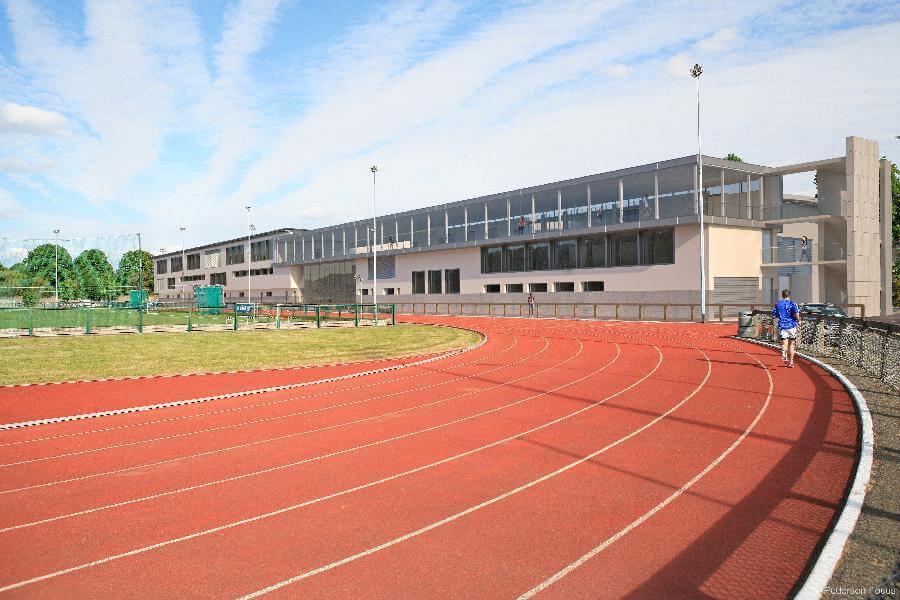
In the summer months, UCC hopes to reopen the Mardyke track to Registered Clubs and Registered Users only, along with College students and staff. There will be an electronic portal trackside, where each authorised user will 'Tag In'/'Tag Out'. The precise timeline for ReOpening has not been established yet, but UCC are actively working towards ReOpening.
Existing Race Permits
Athletics Ireland will be issuing a statement regarding permits shortly. Currently NO new permits are being considered, processed or issued.
A relatively large number of permits, issued before the COVID-19 crisis, are still in force. Many events have already cancelled, with some organisers, particularly those with events later in the year, are holding back on decisions, likely hoping that the situation changes.
However a small number of events appear to be going ahead, even though such gatherings would contravene HSE, Sport Ireland and AAI guidelines. All clubs and event organisers are reminded that AAI insurance, and, almost certainly, all insurance policies will NOT cover events that contravene guidelines in force at the time. The forthcoming Athletics Ireland statement on Permits should provide clarity on the situation.
Separately, Athletics Ireland has told Cork Athletics that it "does not see a return to competition before the autumn", and that "the first events are likely to be smaller ones, and 'down the country', in controlled situations" (e.g. on athletic tracks, or cross-country. In both situations, access and recording of details of those present can be recorded relatively easily, and numbers controlled also.
Please, please abide by the spirit of the HSE guidelines.
Related Articles
Covid 19 - Athletics Ireland Statement re Phase 2 - June 5th 2020
Covid 19 - Athletics Ireland Statement - June 2nd 2020
Covid 19 - Serious Training Issues
Re-Starting Clubs - Covid-19 Update May 9th 2020
Covid 19 and Long Runs or Long Periods in Public
Update - Athletics Ireland Events and Covid 19 Coronavirus - March 24th
Update - Athletics Ireland Events and Covid 19 Coronavirus - March 12th
Athletics Ireland Events and Covid 19 Coronavirus - March 7th
Always follow the Government Guidelines of
Good Hand Hygiene - Respiratory Etiquette - Social Distancing
May 31st 2020
Essie O'Leary (née Kingston), R.I.P.
The Officers and Officials of Cork Athletics County Board extend their condolences and deepest sympathy to our esteemed colleague Neilie O'Leary (Belgooly AC and formerly Bandon AC) and his family; Catriona, Siobhan, Valerie, Margaret and Gerard on the death of is wife Esther (Essie).
Essie joined Bandon AC, following a period with Rising Sun AC, and wasa member of the victorious Cork team at the 1967 Munster Cross-Country Championships, in Moyne, Co. Tipperary
The death has occurred of Esther (Essie) O' Leary (née Kingston), Gurteen, Bandon, Cork
On May 31st 2020, unexpectedly, in the wonderful care of the staff in the Coronary Care Unit at Cork University Hospital. Esther (Essie) (née Kingston), Gurteen, Bandon, beloved wife of Neilie and loving mother of Catriona, Siobhan, Valerie, Margaret and Gerard. Sadly missed by her loving family, their spouses and partners, sisters Margaret, Frances, Theresa, Mary and the late Philomena, grandchildren, brothers in law, sisters in law, nephews, nieces, relatives, neighbours and friends.
May She Rest In Peace
Due to current guidelines regarding public gatherings, Essie’s funeral took place privately. Family flowers only, donations, if desired, to Irish Heart Foundation. Messages of condolence can be left on condolences link.
This article, by John Walshe, appeared in The Echo, on Tuesday June 2nd 2020
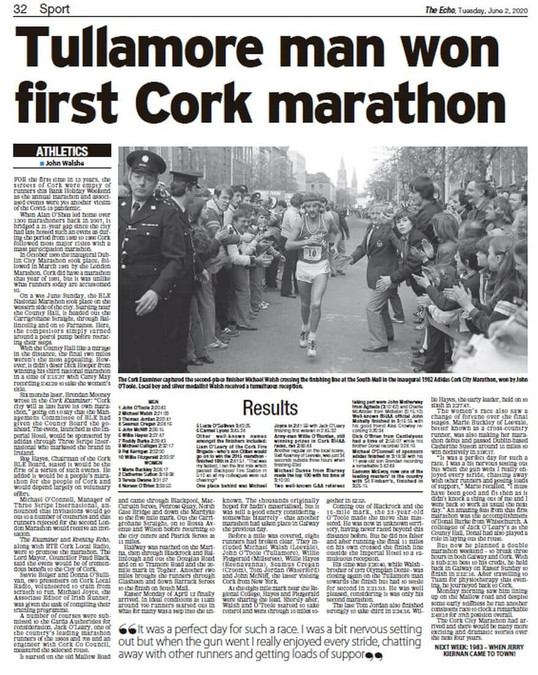
Echo Article, Tuesday June 2nd 2020
For the first time in 13 years, the streets of Cork were empty of runners this Bank Holiday Weekend, as the annual marathon and associated events were yet another victim of the Covid-19 pandemic.
When Alan O’Shea led home over 1,300 marathoners, back in 2007, it bridged a 21-year gap since the city had last hosted such an event, as during the period from 1982 to 1986, Cork followed most major cities with a mass-participation marathon.
In October 1980, the inaugural Dublin City Marathon took place, followed, in March 1981, by the London Marathon. Cork did have a marathon that year of 1981, but it was unlike what runners today are accustomed to.
On a wet June Sunday, the BLE National Marathon took place on the western side of the city. Starting near the County Hall, it headed out the Carrigrohane Straight, through Ballincollig and on to Farnanes. Here, the competitors simply turned around a petrol pump before retracing their steps.
With the County Hall like a mirage in the distance, the final two miles weren’t the most appealing. However, it didn’t deter Dick Hooper from winning his third national marathon, in a time of 2:15:37, with Carey May recording 2:42:39, to take the women’s title.
Six months later, Brendan Mooney wrote in the Cork Examiner: “Cork city will at last have its own marathon,” going on to say that the Management Committee of BLE had given the County Board the go-ahead. The event, launched at the Imperial Hotel, would be sponsored by Adidas through, Three Stripe International, who marketed the brand in Ireland.
Reg Hayes, Chairman of the Cork BLE Board, stated it would be the first of a series of such events. He added it would be a people’s marathon for the people of Cork, and would depend largely on voluntary effort.
Michael O’Connell, Manager of Three Stripe International, announced that invitations would go out to a number of countries and that runners rejected for the second London Marathon would receive an invitation.
The Examiner and Evening Echo, along with RTÉ Cork Local Radio, were to promote the marathon. The Lord Mayor, Councillor Paud Black, said the event would be of tremendous benefit to the City of Cork.
Stevie Bolger and Donna O’Sullivan, two presenters on Cork Local Radio, volunteered to train from scratch to run. Michael Joyce, the Associate Editor of Irish Runner, was given the task of compiling their training programme.
A number of courses were submitted to the Garda Authorities for consideration. Jack O’Leary, one of the country’s leading marathon runners of the 1960s and 70s, and an engineer with Cork Co Council, measured the selected route.
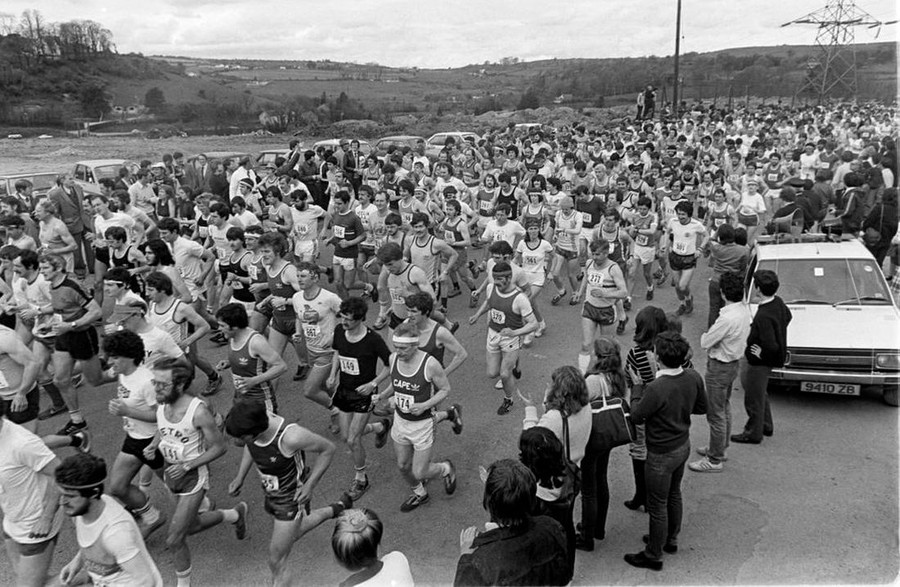
The packed start of the Cork City Marathon in April in 1982.
It started on the old Mallow Road, and came through Blackpool, MacCurtain Street, Penrose Quay, North Gate Bridge and down the Mardyke to the five-mile mark. Out the Carrigrohane Straight, on to Rossa Avenue and Wilton before returning to the city centre and Patrick Street at 11 miles.
Halfway was reached on the Marina, then through Blackrock and Ballinlough, and out the Douglas Road and on to Tramore Road, and the 20-mile mark in Togher. Another two miles brought the runners through Glasheen and down Barrack Street to the finish on South Mall.
Easter Monday of April 12 finally arrived. In ideal conditions at 11am, around 700 runners started out in what for many was a step into the unknown. The thousands originally hoped for hadn’t materialised, but it was still a good entry considering - somewhat bizarrely - that another marathon had taken place in Galway the previous day.
Before a mile was covered, eight runners had broken clear. They included Michael Walsh (Leevale), John O’Toole (Tullamore), Willie Fitzgerald (Millstreet), Willie Hayes (Reenavanna), Seamus Cregan (Croom), Tom Jordan (Waterford) and John McNiff, the latter visiting Cork from New York.
At the eight mile mark, near the Regional College, Hayes and Fitzgerald were sharing the lead. Shortly after, Walsh and O’Toole started to take control, and went through 10 miles together, in 52:53.
Coming out of Blackrock and the 15-mile mark, the 23-year-old O’Toole made the move that mattered. He was now in unknown territory, having never raced beyond this distance before. But he did not falter and after running the final 11 miles on his own crossed the finish line, outside the Imperial Hotel, to a tumultuous reception.
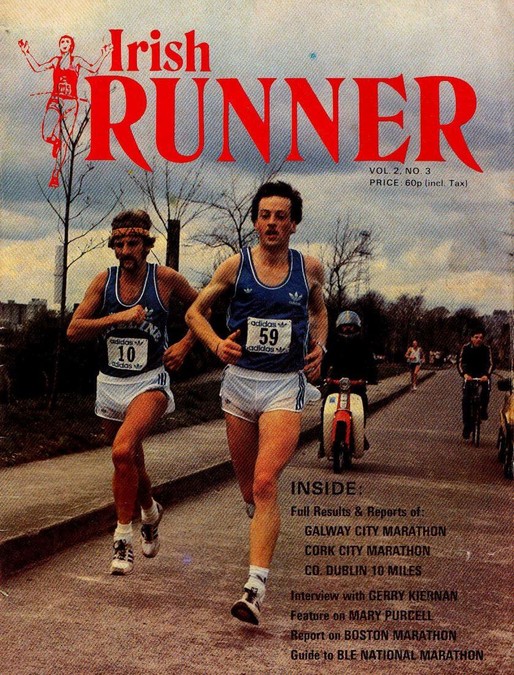
Stride for Stride - Michale Walsh and John O'Toole coming down the Marina
His time was 2:20:40, while Walsh - brother of 1972 Olympian Donie - was closing again on the Tullamore man, towards the finish, but had to settle for second in 2:21:03. He was well pleased, considering it was only his second marathon.
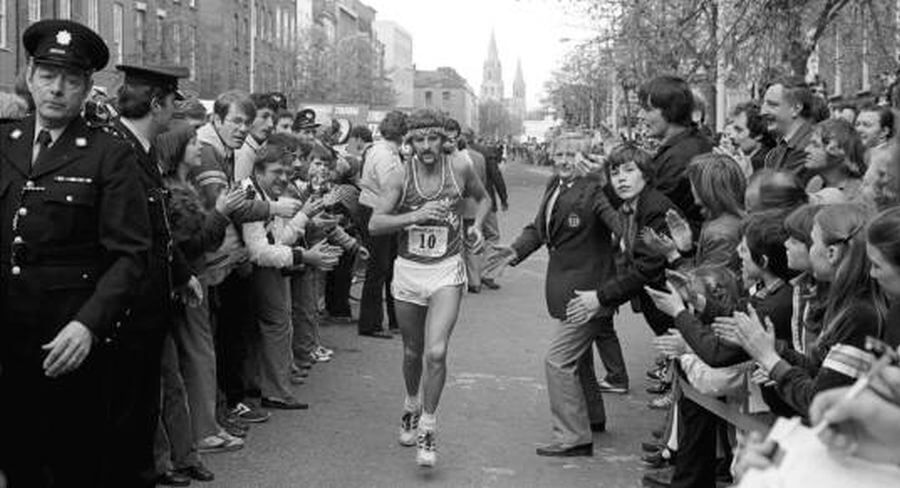
Michael Walsh finishes in 2:21:03
The late Tom Jordan also finished strongly, to take third in 2:24:16. Willie Hayes, the early leader, held on to sixth in 2:27:47.
The women’s race also saw a change of fortune over the final stages. Marie Buckley of Leevale, better known as a cross-country runner, was also making her marathon debut, and passed Dublin-based Catherine Sutton around 15 miles, to win decisively in 3:08:17.
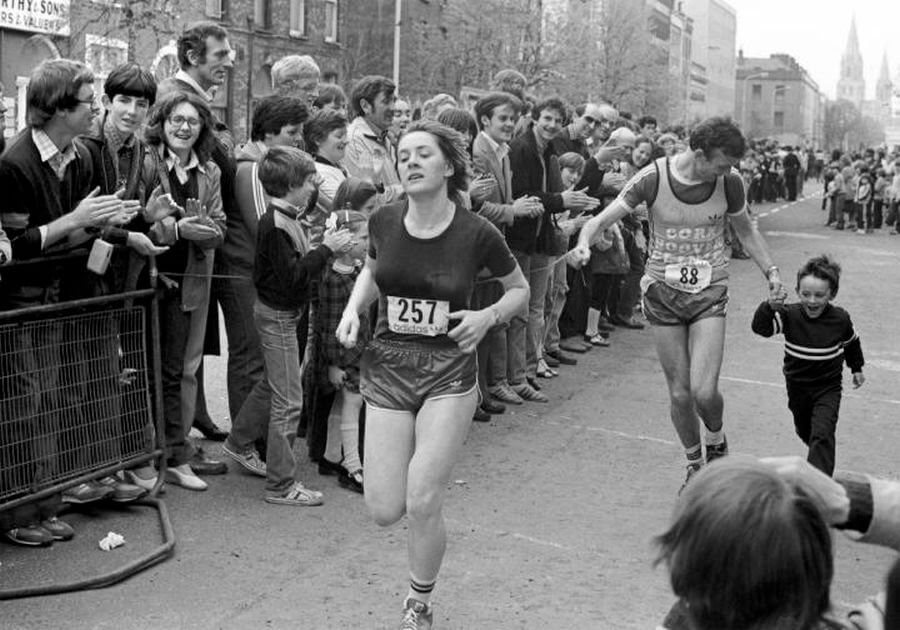 Marie Buckley, Kinsale, the first woman over the finishing line.
Marie Buckley, Kinsale, the first woman over the finishing line.
“It was a perfect day for such a race. I was a bit nervous setting out but when the gun went I really enjoyed every stride, chatting away with other runners and getting loads of support,” Marie recalled. “I must have been good and fit then as it didn’t knock a thing out of me and I went back to work as usual the next day.”
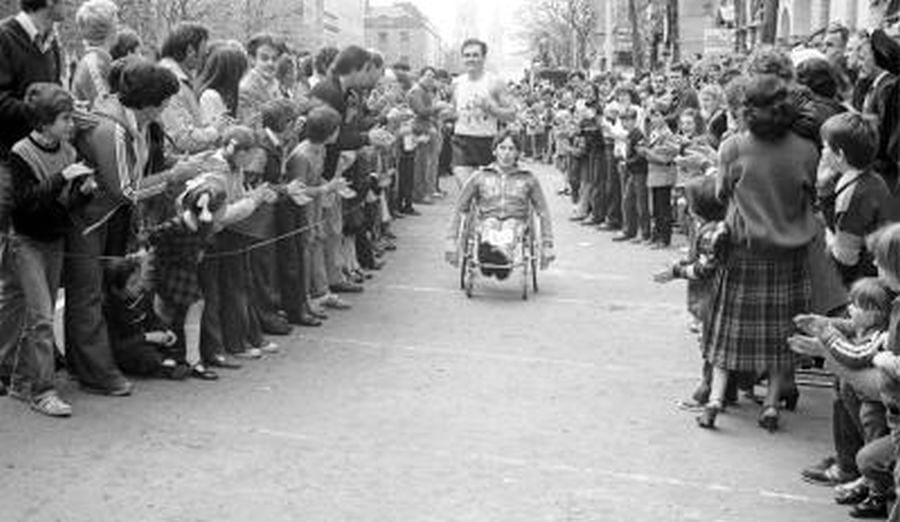
Gerard O'Reilly, the first wheelchair competitor home.
An amazing feat from that first marathon was the accomplishment of Donal Burke, from Whitechurch. A colleague of Jack O’Leary’s at the County Hall, Donal had also played a role in laying out the route.
But now he planned a double marathon weekend – to break three hours in both Galway and Cork. With a sub-2:35 best to his credit, he held back in Galway on Easter Sunday to finish in 2:52:16. After travelling to Tuam for physiotherapy that evening, he journeyed back to Cork.
Monday morning saw him lining up on the Mallow road and despite some early stiffness he ran another consistent race to clock a remarkable 2:49:18 for 37th position overall.
The Cork City Marathon had arrived, and there would be many more exciting and dramatic stories over the next four years.
| Men | |||
| Pos | Forename | Surname | Time |
| 1 | John | O'Toole | 02:20:40 |
| 2 | Michael | Walsh | 02:21:03 |
| 3 | Thomas | Jordan | 02:22:41 |
| 4 | Seamus | Cregan | 02:24:16 |
| 5 | John | McNiff | 02:26:15 |
| 6 | Willie | Hayes | 02:27:47 |
| 7 | Roddy | Burke | 02:29:43 |
| 8 | Michael | Culligan | 02:32:17 |
| 9 | Pat | Kerrigan | 02:32:30 |
| 10 | Willie | Fitzgerald | 02:33:37 |
| Women | |||
| Pos | Forename | Surname | Time |
| 1 | Marie | Buckley | 03:08:17 |
| 2 | Catherine | Sutton | 03:19:08 |
| 3 | Teresa | Dwane | 03:31:27 |
| 4 | Noreen | O'Brien | 03:38:53 |
| 5 | Lucia | O'Sullivan | 03:43:25 |
| 6 | Carmel | Lyons | 03:45:24 |
Other well-known names amongst the finishers included:
Liam O’Leary of the Cork Fire Brigade – whose son Cillian would go on to win the 2015 marathon - finished 18th in 2:41:51. “That was my fastest; I ran the first mile which passed Blackpool Fire Station in 5:10 as all my colleagues were out cheering!”
One place behind was Michael Joyce in 2:41:59 with Jack O’Leary finishing first veteran in 2:45:32
Army-man Willie O’Riordan, still winning prizes in Cork BHAA races, ran 2:48:44
Another regular on the local scene, Batt Kearney of Leevale, was just 34 seconds outside three hours when finishing 63rd
Michael Dunne from Blarney made the top 100 with his time of 3:10:00
Two well-known GAA referees taking part were John Motherway from Aghada (3:12:42) and Charlie McAllister from Midleton (3:15:10)
Well-known BHAA official John Mohally finished in 3:16:35 with his good friend Alex Crowley recording 3:20:34
Dick O’Brien from Castlelyons had a time of 2:58:07 while his brother Donal recorded 3:24:16
Michael O’Connell of sponsors Adidas finished in 3:18:38 with his 11-year-old son Brendan recording a remarkable 3:42:48
Eamonn McEvoy, now one of the leading masters’ in the country with St Finbarr’s, finished in 3:25:15
Other Guest Articles by John Walshe
Pioneering Women of Cross-Country - Guest Article by John Walshe
Grange International Cross-Country of 1980 Recalled 40 Years On - Guest Article by John Walshe
Youghal AC's London Emer Casey 10k Exploits
30 Years Ago - Liam O'Brien Wins Cork County Senior Cross-Country Championship
50 Years Ago - When John Buckley Beat The Olympic Champion
40 Years Ago - Jerry Murphy Wins Munster Marathon Championship
Aoife Cooke Runs 55:17 in Mallow 10 2019
Steeplechase Legends Meet at Antrim International
Unique National Double for McGraths
Dick Hooper Speaks at St Finbarrs AC Function
Club Profile by Dick Hooper
Irish Runner Magazine - July-August 1988, Vol 8, No 5, P36-38
Download Article (PDF File)
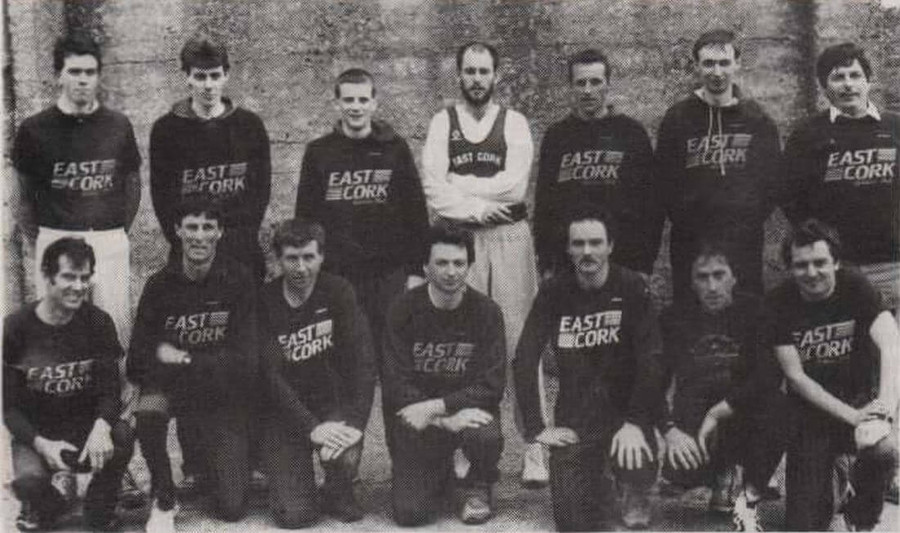
Standing left to right: J. Walsh, D. O'Mathuna G. Wallace, L. McCarthy, L O'Brien, B. Meade, Fr. L. O'Brien
Front Row Left to Right: P. Mullholland, Jim Curtin, T. Cashman, E. Meade, J. Walsh, B. Moran
In the beginning there was a man and a boy, and they were both named Liam. And God called the man Liam, and asked him to follow Him, and to be His minister for athletics in Ireland. And He gave him special responsibility for Cork.
And so the man Liam answered God’s call, and became Rev. Fr. Liam, and arrived as an enthusiastic missionary in a town called Midleton, in the eastern part of the county called Cork.
And when the young priest looked out on the congregation of youth before him, he set eyes on the boy Liam, with the severe haircut. And the man Liam blessed the boy Liam, and having looked after his spiritual needs encouraged him to run. And the two Liams became friends.
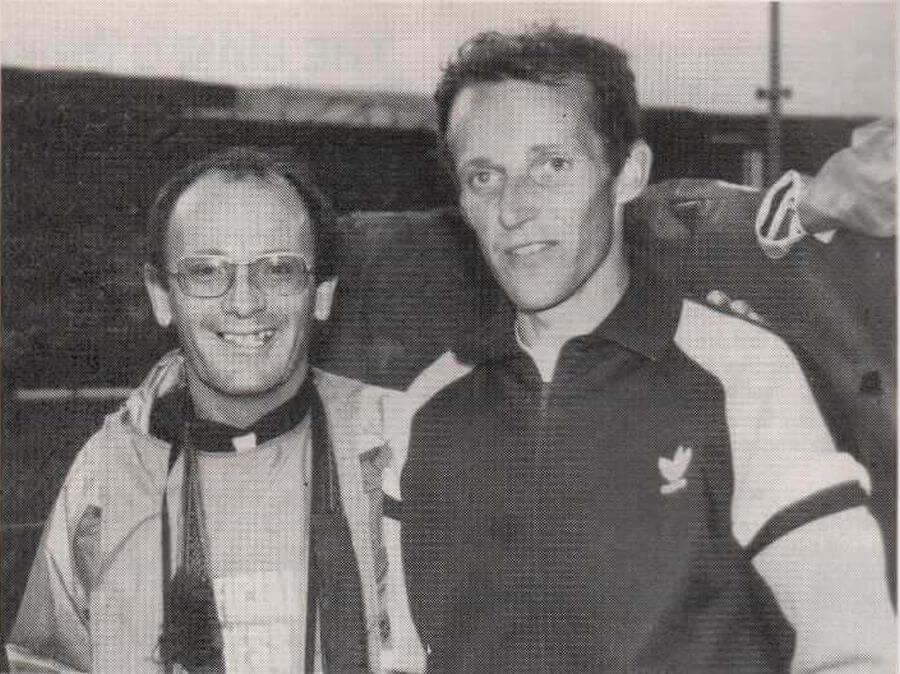
And it came to pass, in the early 1970s, that Fr. Liam (Kelleher) had built up the best juvenile athletic club in Ireland, with huge numbers competing, and winning ,under the name of Midleton A.C. And many times, Fr. Liam spoke to the boy Liam (O’Brien) of his dream and it was this ... ‘that all the clubs in Eastern Cork unite to form one strong club that could compete on an even footing with the larger clubs in Ireland.’
And the boy Liam listened and always remembered it. But he too had his dreams .. he wanted to become a great runner, and compete in the Olympic Games. And so it came to pass that his dream became reality, and he became one of Cork’s finest ever running sons, broke the Irish Steeplechase record, ran several times for his country, and competed in the Olympic Games and World Championships. But he never forgot Fr. Liam’s dream, and the passage of time gave the idea further urgency and meaning.
And, as is the way of his religion, Fr. Liam was called again by God, and asked to say goodbye to his friends in Midleton, and the base he had built there, and go to pastures new. And, as was his style, Fr. Liam put little-known places on the map by means of the twin tools of sport and persuasion. And when superstars like John Walker and Steve Ovett looked at their itinerary, they found that their next date after Oslo and Stockholm was a mile race in Tullylease. (And the people of Dromina found themselves witness to Jerry Kieman dashing 10 miles around their locality in 46 minutes odd, not once, but twice. But we digress from the East Cork story).
The emergence of East Cork Athletic Club in national athletics has been a story of inexorable progress. The basic concept of the club was for the nine senior clubs in the area to amalgamate at senior level under the one banner. The juvenile sections of the existing clubs would then act as feeders for East Cork A.C., continuing in existence. The club, by the very nature of the county, (Cork is the largest county in Ireland) draws its members from a huge radius. From Youghal, in the East perimeter, to Carrignavar, is a distance of roughly 45 miles, with a north to south range stretching from Watergrasshill to Cobh.
Liam O’Brien was not alone in holding the view which Fr. Kelleher so vehemently expounded all those years ago, that none of the clubs in East Cork would ever be strong enough, individually, to challenge for the bigger spoils. The evidence was utterly convincing. From the foundation of BLE, in 1967, until 1985, only two clubs - Leevale and St. Finbarr’s, had ever won the Cork Senior Cross Country Championship. The view from the city was that the county clubs were a soft touch.
Tony O’Leary, the enduring image of Leevale A.C., welcomes the emergence of East Cork, and the gauntlet they have thrown down. He argues that the shock defeats by East Cork in 1985 and 1986 catapulted Leevale to muster their resources, and regain ‘their’ property again in 1987. Competition is the great elixir.
O’Leary, monitoring the pulse of the county, points to East Cork as being the only growth area in Cork athletics. Certainly the decline in the once great Leevale’s fortunes is quite alarming.
The members of East Cork are sensitive to accusations that they are a club of convenience - a club devoid of identity. Where is the clubhouse? Where is the focal point? As with any club that draws from a large hinterland, identity is a problem. Midleton CBS is technically the club’s headquarters.
It is here that the athletes meet and train and the officials hold their meetings.
Barry Moran, a club official and athlete, is adamant that ‘the club do not want to be seen as an elitist club.’ He points to the range of standards in the club. Certainly the story of his first marathon - (Cork, 1981) - will strike a familiar chord with many.
Barry approached what he thought was the finish line - it was actually the 26 mile mark, and he was so disgusted to find that he was not quite finished, that he just sat down on the road for half an hour, before trudging the final 385 yards.
Without doubt, the spirit of those involved in the club is infectious, and it is on this that the club is building its future. Ironically, yet another Liam O’Brien is the club chairman - Father Liam O’Brien. If Liam O’Brien the athlete is the Pied Piper among the athletes, it is Fr. Liam O’Brien who is the driving force administratively in the club.
The club has a social outing of some sort every month, and this is viewed as vital for club spirit. Amazingly, among the 60 or so members of the club, there is only one member who takes a drink. But sure everybody knows that chairmen have to be able to hold their own in any company .. . It’s part of the job. There is also a regular club newsletter, with news items ranging from race results and fixtures, to Barry Moran’s heroic efforts to recruit athletes for the club, prior to his clobbering the wall in the Dublin City Marathon.
In deference to the wishes of the originators of the East Cork concept, the senior clubs from which they wish to draw members, Midleton, Carrignavar, St. Conans and the rest all continue to exist. A lot of athletes have opted to stay with their home parish club, rather than join East Cork, Sonia O’Sullivan’s decision to stay with Ballymore-Cobh being the most obvious. It is a soul-searching decision.
ROAD RELAY TRIUMPH
From another perspective, the fact of many athletes leaving the local Eastern clubs, and joining East Cork has further weakened them, and rendered team competition against the might of East Cork, in that area, virtually meaningless. (Hopefully any ill feeling that may exist will subside, and individuals will at least feel free to join whichever club they like).
This year, in Loughrea, an East Cork team comprising of Brian Meade, Donncha O’Mahony, Jerry Wallace, Liam O’Brien, Laurence McCarthy and Tom Walsh won the National Road Relay, an unprecedented and magnificent achievement. It marked the culmination of the clubs rise. This is good for the sport. It re-invigorates it and breaks the Donore - Clonliffe monopoly.
Liam O’Brien, the athlete, holds the view that in many areas of the country clubs should be regionalised, to promote competition, and help improve standards. He has a point and it is worthy of the most meaningful debate.
And, seemingly to improve the already good wine, the Lord has intervened again, and directed Fr. Liam Kelleher back to East Cork, to the parish of Inch. What effect is this going to have? A very significant one, if the past is any indication. After all, one dream has already matured. As we drove back from Cork, on a beautiful Sunday evening, we wondered if Said Aouita and Steve Cram were yet aware that they would be clashing in the mile in the Inch Sports, at the opening of the local Tartan track next year...
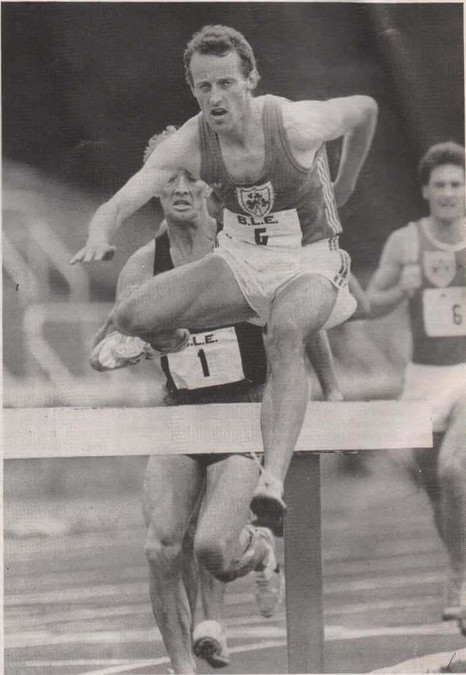
Date of Birth: 11th October, 1954. Height: 1.78m - Weight: 147 lbs. Club: East Cork A.C.
Job: Secondary School Teacher. Self Coached.
Steeplechase
1974: 1975:
1976: 1977:
1978: 1st 1979: 1st
1980: 1st 1981: 1st
1982: 3rd. 1st B. Quinn. 2nd G. Bany. 1983: 1st 1984: 1st
1985: 2nd 1st B. Quinn 1986: 1st
1987: 1st
Record in BLE National 3,000m
400m Hurdles: 57.3.
• Irish international at track, road and cross country.
• Winner of a record 8 Irish Steeplechase titles.
• Competed in 1984 Olympic Games and was a semi-finalist there.
• Competed in 1987 World Championships.
• Won first ever BLOE U.16 steeplechase title.
• Since formation of BLE/BLOE in 1967 has won a National medal of some sort (team or individual) every year including 1988.
• Has won Cork titles at every distance from 400m to 5,000m including 400m hurdles and steeplechase.
Track
400m: 50.5 800m: 1.50.5 1,500m: 3.44.6 3,000m: 7.58 5,000m: 13.36.
Mile: 4.00.8.
3,000m steeplechase: 8.27.24.
Road
10k: 29.20 10 miles: 47.57 Half Marathon: 67.22. 15 miles: 77.38.
PERSONAL BESTS
Typical Week’s Training in Winter (January - April)
Monday: a.m. 4 miles p.m. 2 hour run (16 - 18 miles)
Tuesday a.m. 4 miles p.m. 43 minute hill session
Wednesday a.m. 4 miles p.m. 1 3 miles Thursday a.m. 4 miles p.m. 5 x 1,000m with 2 minutes recovery Friday a.m. 4 miles p.m. 13 miles Saturday a.m. 42 minutes Hill session p.m. 4 miles
Sunday: Race or orienteering.
• For summer training replaces Tuesday, Thursday and Saturday session with track workouts.
• Takes two weeks off completely in September and ‘ticks over’ until end of December.
• Dislikes framing and does not keep a diary.
• Hates front running, preferring to use his finishing kick. Ambition in every race is ‘to win by the least possible margin’... ‘Would prefer to win a mile in 4.10 than finish 4lh in 3.55.’
• Does not do any specific steeplechase training.’
It is difficult to evaluate what motivates a race organiser. What class of vocation is this that persuades a man to tolerate the work-load and sheer hassle of putting on a foot race on tarmacadam.
Ballycotton's John Walshe is no ordinary race promoter. He is arguably the best in the country. At home, John Waishe is a farmer.
He was bom into the land, and he loves its moods and murmurings. He is, one suspects, an eccentric farmer - his eccentricity being that he also finds time to be a dedicated long distance runner. He is a good one too. He has run 19 marathons, and is the owner of a 2:36:31 PB. He has also, one further suspects, an insatiable appetite for reading. At least two rooms in his house resemble an athletics library. Yet it is the front room that most attracts the eye. What are a photocopier, a results printe, stacks of entry forms, mementoes and prizes doing in the front of an East Cork farmer's house. This, (oh! ye of little understanding), is the 'office’ of Ballycotton Running Promotions. The ordered nature of the room parallels the superb organisation at Ballycotton races. Walshe can put his hand readily on any piece of equipment or reference sought. Any praise and he is quick to lavish praise on his ’staff' ....the races
themselves do the best talking. The Ballycotton ‘10’ held every year in early March is the biggest and best ‘Ten’ in the country. It preceded the running boom by a couple of years and will long outlive it. This race is John Walshe’s baby. He has guided expertly its growth and development. Less known nationally, but equally popular with southern runners is the Ballycotton ‘5’ mile ser.es - a package of 4 races held on the fourth Thursday of each month from May to August, in Ballyandreen, Shanagarry, Churchtown South and Ballycotton. Since the inception of the series, there have been 38 races. Some chap called Liam O’Brien has won 28 of these from 32 starts and hasn't been beaten since August 1981. Who provided us with the statistics? — some chap called John Waishe — seems to know a thing or two about road races. A lot of John Walshe’s success as a race promoter has been his ability (and confidence) to delegate responsibility. Gather the right cabinet around him. How many race promoters compete in their own events — Walshe does. Nothing sums it up better than the quotation in this year’s Ballycotton ‘10’ programme ...
This is a story of four people named Everybody, Somebody, Anybody and Nobody. There was an important job to be done and Everybody was sure that Somebody would do it. Anybody could have done it, but Nobody did it. Somebody got angry about that because it was Everybody's job. Everybody thought Anybody could do it but Nobody realised that Everybody wouldn't do it. It ended up that Everybody blamed Somebody when actually Nobody accused Anybody.
Related Articles
Irish Runner Magazine Archives
Subscribe to Irish Runner Magazine
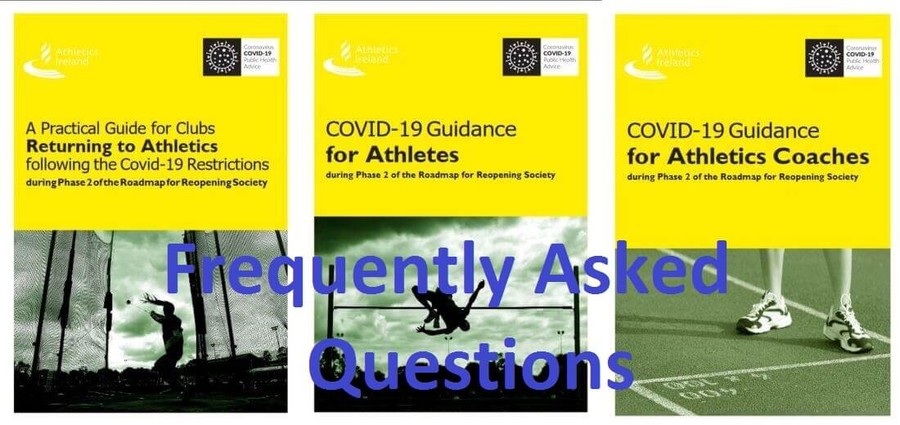
Key Developments in Phase 2 include:
Groups of up to 15, including trainers and coaches, may return to non-contact outdoor training activity (but not matches) while maintaining social distancing at all times.
You may travel within your own county, or up to 20 kilometres from your home if crossing county boundaries.
Can 12-year olds turning 13 years in 2020 train with their age group?
Yes, all those born in 2007 and before can train in their club and are insured.
Will there be any Track and Field Competition this year?
The Juvenile and Competition Committees are meeting regularly to plan a return to competition within government guidelines. Provisional dates in August and September are planned for Under 14 groups and above and these will be published in the coming days. Note – all dates will be contingent on meeting government guidelines.
Can Over 70’s attend the Club?
In relation to the vulnerable Over 70 years population, the advice currently is that they may leave their houses for exercise, but they should limit contact with other people, even on a socially distanced basis. This advice does not recommend over 70s attending sports clubs however, it is not mandatory, it is advisory, so individuals can make their own decisions.
Will Summer Camps Proceed?
Government guidelines allow summer camps to proceed in line with strict procedures around outdoor activity only, social distancing, contact tracing and excellent hygiene. A final decision on Athletics Ireland Summer Camps proceeding will be made in the coming days.
Logistics of attending a club session - example
Can more than one group of 15 operate in my club at once?
Yes, your club is responsible for developing its own risk assessment document. If the club believes it can safely operate with more than one group on site then it can. The risk assessment is subject to meeting all social distancing, contact tracing and hygiene requirements.
Do all attending need to complete the health screening questionnaire?
Yes, all attending the club must complete the health screening questionnaire. At the very least the coach should read the questionnaire aloud to all groups and any participant answering yes to the session should be excluded and contact their GP.
We meet as a training group in a local park, does the AAI insurance cover us there?
Yes, once you are a club committee approved group the insurance policy is in place for you.
Does the Club Covid Compliance Officer need to have medical qualifications or expertise?
No, the role of the Club Covid Officer is detailed in the Club Covid Guidelines on page 2 and they do not need to have medical experience
Will Athletics Ireland provide training on Club Covid Compliance Officer?
There is a webinar on the Athletics Ireland website This page has related information and guidance on the role. Sport Ireland will be providing additional training supports in time and these will be released to the clubs in due course.
Is the club required to put up Covid-19 posters?
Yes, if possible, it is important to advise visitors of their responsibility to maintain social distance, hygiene and sneezing/cough etiquette.
Is the Covid Compliance Officer solely responsible for ensuring good practices on our return to activity in our club?
No, everyone is equally responsible for ensuring best practices are implemented, the Covid-19 officer merely coordinates that plan.
Is the coach one of the fifteen or is it fifteen athletes and a coach?
The coach is counted as one of the fifteen.
Cork Athletics County Board is still awaiting information from Athletics Ireland regarding the status of existing Race Permits. Many events have permits which were granted before the COVID-19 crisis. These permits are still valid, however McMahon Galvin, Athletics Ireland's Insurance Brokers, confirmed to Cork Athletics, yesterday, that insurance cover for all events remains suspended until further notice. In effect, this means that events may not proceed at present. In addition, race organisers will probably find that there are issues with other critical race matters, for example Medical Cover (e.g. Red Cross, etc)
While things are opening up slowly, and we may see T&F and/or Cross-Country from late August, it appears unlikely that road racing will resume for the foreseeable future. Several races are holding out, watching each other, waiting to see who blinks first, but bottom line is, without HSE Guideline compliance, it is hard to see any event getting insurance or medical cover, so we will probably have to hold tough for a while longer
Please, please abide by the spirit of the HSE guidelines.
Related Articles
Covid 19 - Return to Sport Expert Group Release - June 6th 2020
Covid 19 - Athletics Ireland Statement - June 2nd 2020
Covid 19 - Serious Training Issues
Re-Starting Clubs - Covid-19 Update May 9th 2020
Covid 19 and Long Runs or Long Periods in Public
Update - Athletics Ireland Events and Covid 19 Coronavirus - March 24th
Update - Athletics Ireland Events and Covid 19 Coronavirus - March 12th
Athletics Ireland Events and Covid 19 Coronavirus - March 7th
Sunday September 20th 2020
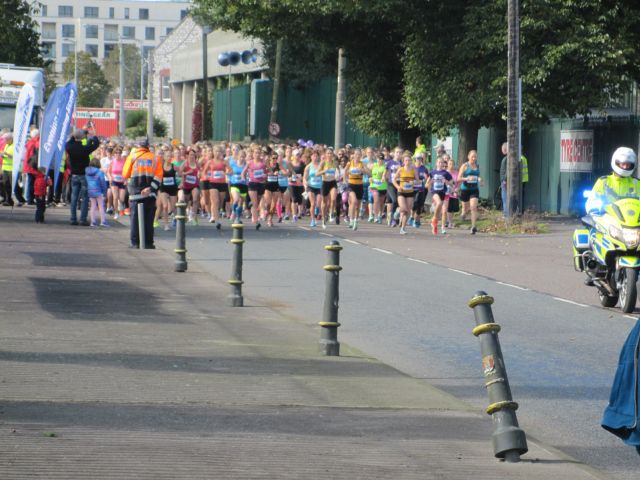
This year's Mini-Marathon is changing! We're not saying, just yet,what the format will be, but the organisers, Cork Athletics County Board, are committed to ensuring that Cork's women, who walk and and run the event every year, and, in doing so, raise approx. €1M for their chosen charities, will not miss out due to the COVID-19 pandemic.
This year, in particular, the focus will be on facilitating participants fund raise for charity, at a time when charities have been badly hit by cancelled collections and flag days, along with closure of their charity shops, and many other fundraising activities.
Today, Wednesday June 10th, The Echo has featured the Mini-Marathon, on both the front page and also inside the paper. This year's 'special format' event will be launched later this month, giving all the details of the options available. The Registration page will be going live at the same time.
The Flagship Sponsor for the past 39 years has been The Echo
2019 Finishers Medal
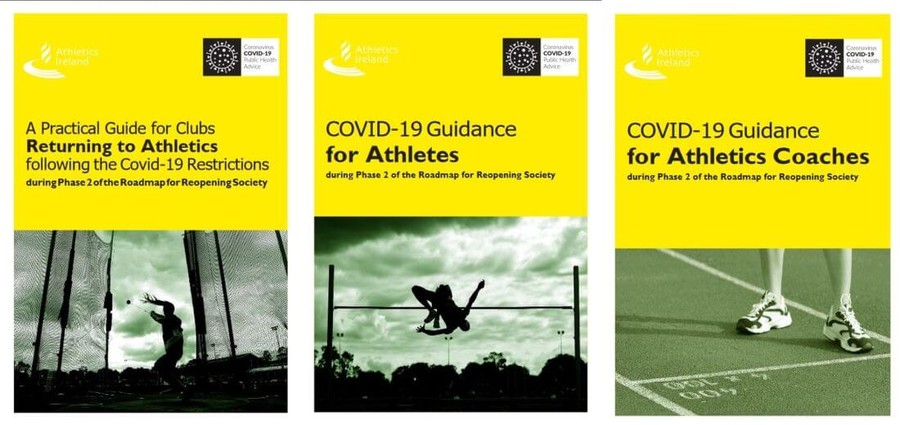
Athletics Ireland is delighted to share the Phase 2 guidance protocols with you as we exit lockdown. The good news announced by our Taoiseach this afternoon includes an increase in the size of outdoor training groups to fifteen (15) and an extension to the distance we can travel to train. People can travel within their own County, or up to 20km from their home, whichever is further.
Guidance for Clubs (PDF File) - Content
Guidance for Athletes (PDF File) - Content
Guidance for Coaches (PDF File) - Content
Note these protocols do not commence until this Monday the 8th June 2020.
Sport Ireland Statement re Return to Training for High Performance Athletes
Please, please abide by the spirit of the HSE guidelines.
Related Articles
Covid 19 - Athletics Ireland Statement - June 2nd 2020
Covid 19 - Serious Training Issues
Re-Starting Clubs - Covid-19 Update May 9th 2020
Covid 19 and Long Runs or Long Periods in Public
Update - Athletics Ireland Events and Covid 19 Coronavirus - March 24th
Update - Athletics Ireland Events and Covid 19 Coronavirus - March 12th
Athletics Ireland Events and Covid 19 Coronavirus - March 7th
Always follow the Government Guidelines of
Good Hand Hygiene - Respiratory Etiquette - Social Distancing
The guidelines in this document relate to Phase 2 of the Irish Government's Roadmap for Reopening Society and Business.
Key Notes for this phase:
1. Permits sporting activity in open outdoor public sports amenities where social distancing can be maintained.
2. Permits people to engage in outdoor sporting and fitness activities, either individually or in a group (maximum 15 people), where social distancing can be maintained and where there is no contact.
3. Permits those individuals travel within their own county, or up to 20 km from their home, whichever is greater.
4. If you feel unwell do not present to the club.
5. If you are recovering from Covidl9 seek medical advice prior to returning to train.
6. If running in single file increase the distance between athletes to more than 2m.
Clubs MUST appoint an assigned Safety Officer responsible for managing issues and queries relating to the Covid-19 pandemic.
This Officer should:
In the initial period following a club's reopening, access to the clubhouse should be limited to committee members only and only for emergency access by athletes.
3. Booking and Arrival
Two-metre queue markers should be in place at any single-entry point.
For endurance sessions:
o Athletes running single file unless there is an empty space where they can leave greater than 2m between them.
o Athletes running with greater than 2m between themselves and the next runner. This might, for example, mean overtaking in lane 3 to pass an athlete running in lane one on a track.
o Athletes starting intervals in approximate order of ability with the fastest athlete starting first to minimize overtaking.
Return to Restricted Training
Always follow the Government Guidelines of
Good Hand Hygiene - Respiratory Etiquette - Social Distancing
The guidelines in this document relate to Phase 2 of the Irish Government's Roadmap for Reopening Society and Business.
Key Notes for this Phase:
1. Permits sporting activity in open outdoor publicsportsamenitieswhere social distancing can be maintained
2. Permits people to engage in outdoor sporting and fitness activities, either individually or in a group (maximum 15 people), where social distancing can be maintained and where there is no contact
3. Permits those individuals travel within their own county, or up to 20 km from their home, whichever is greater
4. If you feel unwell do not present to the club
5. If you are recovering from Covidl9 seek medical advice prior to returning to train
6. If running in single file increase the distance between athletes to more than 2m
This practical guide, prepared by our team in consultation with international norms and medical experts, outlines the robust measures Athletics Ireland would like clubs to implement with coaches and athletes to maintain to help safe-guard members during the COVID-19 pandemic.
The measures, which relate to Phase 2 of the Roadmap for ReOpening Irish Society and Business, cover each step of the journey from home to the club gate and back home again.
These measures should be in place seven days a week and until further notice.
Our measures and proceduresare underconstant review and updated as advice from government, health authorities and governing bodies evolves in line with the gradual lifting of social restrictions.
You must stay at home if you:
Have been in contact with someone with COVID-19 in the last 14 days
Have been overseas or exposed to someone with COVID-19 in the last 14 days
Have flu-like symptoms or are feeling unwell
You must:
Check with your GP prior to playing if you are in a high-risk health category
Find out what protocols are in place at the club
Ensure your club has up-to-date contact details for you
Pre-book your training session on the AAI booking system, or via phone Arrive and leave as close as possible to when you are due at the club.
Only one parent/guardian should accompany younger athletes where possible.
Athletes should arrive ready to train as there will be no access to dressing rooms duringthis phase.
Athletes should ensure that they utilize toilet facilities in their own home prior to arriving at the club, as toilet facilities will not be available during thisphase.
Athletes should, ideally, bring a small bottle of hand sanitizer, and antiseptic wipes with them to train.
Pre-book your training session on the AAI booking system, or via phone
Arrive and leave as close as possible to when you are due at the club.
Only one parent/guardian should accompany younger athletes where possible.
Athletes should arrive ready to train as there will be no access to dressing rooms duringthis phase.
Athletes should ensure that they utilize toilet facilities in their own home prior to arriving at the club as toilet facilities will not be available during thisphase.
Athletes should, ideally, bring a small bottle of hand sanitizer and antiseptic wipes with them to train.
To protect against infection:
Athletes must refrain from handshakes and high fives
Keep 2 metres away from other people at all times
Do not share food, towels and drinks
Wash your hands frequently with soap and water or hand-sanitizer, before and after eating, after going to the toilet, sneezing and coughing
Cover your coughs and sneezes and dispose of any used tissue in your own bag and bring it home with you
Avoid touching your face
Keep your distance from people who are obviously sick
Try not to touch any surfaces, but if you do sanitize your hands as soon as possible
• For endurance sessions:
Athletes running single file unless there is an empty space where they can leave greater than 2m between themselves.
Athletes running with greater than 2m between themselves and the next runner, including when overtaking. This might, for example, mean overtaking in lane 3 to pass an athlete running in lane one on a track, o Athletes starting intervals in approximate order of ability with the fastest athlete starting first to minimise overtaking.
Remain apart from other athletes when taking a break.
Once training has finished athletes should leave the club promptly
Hands should be washed and sanitized as soon as possible
Ensure equipment is cleaned thoroughly after use.
If an athlete becomes unwell after training, they should first contact their GP and read the HSE guidelines, and then inform their club. The club will then follow advice provided to them by the HSE on the next steps
Members should be encouraged to remind other members of the guidelines, in a gentle way, wh en th ey witn ess poor p racti ces. Repeated poor practice should be reported to the club as soon as possible
Practice caution with the equipment. Sanitize all handheld implements prior to and after use e.g. shots, javelins, discus etc.
Although there is no specific evidence that equipment can spread COVID-19, we know that contamination from respiratory droplets froman infected person can potentially survive on hard surfaces for up to three days.
Clean equipment with a disinfectant spray at the conclusion of training.
Return to Restricted Training
Always follow the Government Guidelines of
Good Hand Hygiene - Respiratory Etiquette - Social Distancing
The guidelines in this document relate to Phase 2 of the Irish Government's Roadmap for Reopening Society and Business.
Key Noes for this Phase:
1. Permits sporting activity in open outdoor public sports amenities where social distancing can be maintained
2. Permits people to engage in outdoor sporting and fitness activities, either individually or in a group (maximum 15 people), where social distancing can be maintained and where there is no contact
3. Permits those individuals travel within their own county, or up to 20 km from their home, whichever is greater
4. If you feel unwell do not present to the club
5. If you are recovering from Covid19 seek medical advice prior to returning to train
6. If running in single file increase the distance between athletes to more than 2m
This practical guide, prepared by our team in consultation with international norms and medical experts, outlines the robust measures Athletics Ireland would like clubs to implement with coaches and athletes tomaintain to help safeguard club members during the COVID-19 pandemic.
The measures, which relate to Phase 2 of the Roadmap for Reopening Irish Society and Business, cover each step of the journey from home to the club gate and back home again.
These measures should be in place seven days a week and until further notice.
Our measures and procedures are under constant review and updated as advice from government, health authorities and governing bodies evolves in line with the gradual lifting of social restrictions.
Develop and prepare a risk assessment and consult with your club how lessons can be delivered safely
Ensure that you get permission from the club to carry out your session
You or your athlete(s) should stay at home if you or they:
Have been in contact with someone with COVID-19 in the last 14 days
Have been overseas or exposed to someone with COVID-19 in the last 14 days O Have flu-like symptoms
Are in a high-risk health category. Such athletes should consult with their GP prior to training Are over 70 years of age
Sessions should only take place outdoors during this phase of the reopening.
Coaching should take place only where full physical distancing is possible.
Pre book your session at the club online via the AAI booking system or via phone and advise who will be in attendance.
Let your athlete know, preferably in writing, before the session how you expect them to act to help ensure a safe environment for themselves and others, and what precautions you have put in place. Advise parents in the case of younger athletes. Parents should be asked to reiterate the advice to their children pre-training.
Prior to the session inform your athlete that:
Only people core to you r session can be in attendance.
Athletes should arrive and leave as close as possible to when you need to be there.
Onlyoneparent/guardianshouldaccompany younger athletes where possible.
Athletes should arrive ready to train as changing room access will not be possible.
Athletes and coaches should wash their hands with soap and water or hand sanitizer when available, before and assoon as possibleafter the training session.
Athletes should carry a bottle of hand sanitizer and antiseptic wipes at all times.
Limit the use of coaching equipment such as cones.
Don't let the athletes handle any coaching equipment if possible. The coach should pick up any equipment used eg cones.
Be aware of what surfaces you or your athlete(s) touch and if you touch the equipmentsuch as hurdles, cones, rakes etc. you must clean these before you leave. Coaches should haveaccesstodisposable disinfectant wipes at all times.
Maintain physical distancing at all times including when giving feed back and while athletes are resting.
When training finishes athletes must leave the club promptly.
If coaches witness poor practice it should be addressed immediately in a polite fashion and ongoing disregard for protocols should be reported to the club as soon as possible.
• For endurance sessions:
Athletes running single file unless there is an empty space where they can leave a distance of more than 2m between themselves. Athletes running with greater than 2m between them and themselves and the next runner, including when overtaking. This might, for example, mean overtaking in lane 3 to pass an athlete running in lane one on a track.
Athletes starting intervals in approximate order of ability with the fastest athlete starting first to minimise overtaking.
Practice caution with all equipment and avoid letting the athletes touch unnecessarily.
Clean all equipment with a disinfectant spray prior to and after use.
Although there is no specific evidence that equipment can spread COVID-19, we know that contamination by respiratory droplets from an infected person can potentially survive on hard surfaces for up to three days.
Try to restrict equipment to a particular group.
Clean all equipment with a disinfectant spray at the conclusion of your session.
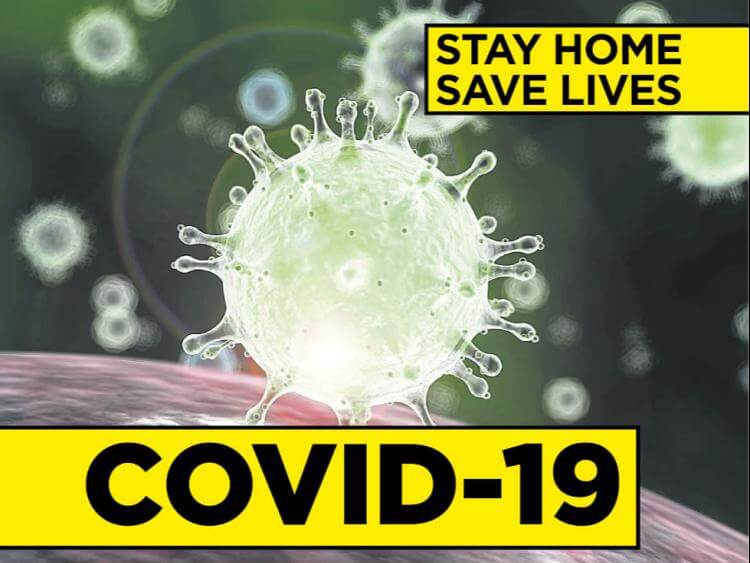
It has come to our attention that several clubs are not adhering to the guidelines issued by Athletics Ireland for Phase I of the return to activity which is very disappointing.
We must note that all Athletics Ireland insurances are null and void if Risk Assessments and Safety officer requirements are not met and that training for those under 13 years is not covered in any form at this time.
Full compliance with the government approved Athletic Ireland guidelines is mandatory and we await Phase 2 approval and specifics through the Sport Ireland Expert Working Group this week.
We strongly remind all Clubs to be extremely vigilant in regard to contact tracing, social distancing and hygiene at this important time for our nation. Camera phones and social media are available to all and it is a very poor reflection on any club and our sport not promoting social distancing and best practice.
- Athletics Ireland
Following Cork Athletics County Board's own release last week: Covid 19 - Serious Training Issues it is with great disappointment that the Board has received further complaints from members of the public about breaches of HSE and AAI COVID-19 Guidelines. These are blantant breaches, where the individuals' clubs can be easily identifiable, due to the wearing of club apparel and/or posting details of these breaches on club and/or individual social media, and/or public forums.
To repeat last week's notice: Athletes and/or clubs are advised that charges of Bringing the Sport into Disrepute may be applied by Cork Athletics County Board and/or Athletics Ireland.
A minority are risking the health and wellbeing of us all. They also risk damaging our good name and reputation and that of sponsors and associates. As a member of management of an associate body said, in relation to these blatant breaches "We have two Pandemics....COVID-19....and Stupidity!"
Please, please abide by the spirit of the HSE guidelines.
Related Articles
Covid 19 - Serious Training Issues
Re-Starting Clubs - Covid-19 Update May 9th 2020
Covid 19 and Long Runs or Long Periods in Public
Update - Athletics Ireland Events and Covid 19 Coronavirus - March 24th
Update - Athletics Ireland Events and Covid 19 Coronavirus - March 12th
Athletics Ireland Events and Covid 19 Coronavirus - March 7th
Cork Athletics County Board is seeking to update it's club contacts list. The current contact list is several years old, and urgently needs to be brought up to date.
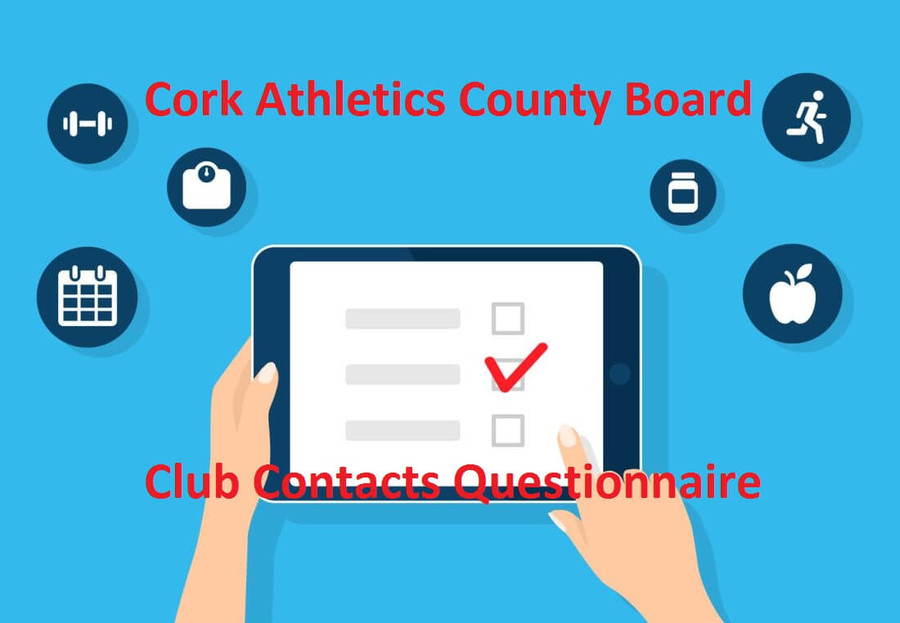
Club Contacts Questionnaire
Can all clubs please complete as soon as possible
Will the personal information supplied in the Questionnaire be made public?
NO! No personal information supplied in the Questionnaire will be made public.
What contacts are Needed and why?
Contact details are needed for the following contacts from each club: Chairman, Secretary, Treasurer, Pro, Social Media Manager(s) and the Club's County Board Delegate(s). They are required so that Cork Athletics County Board may communicate directly and more effectively with each club and, in particular, the appropriate personnel within eacch individual club.
Will the information supplied be used to update the County Board's Club listings, on it's website.
Non-personal information, e.g. Website URL, along with Social Media links, will be posted/updated. Personal information will NOT. However individuals maybe contacted DIRECTLY and their specific consent sought to post such information on the County Board's Club listings.
I don't have all the infotrmation asked for, do I need to get this before filling in the Questionnaire?
No you don't. Incomplete forms can be submitted, with several people filling in for their own area of responsibility within the club. Just complete the sections you know, or are responsible for, and submit.
Friday May 29th 2020
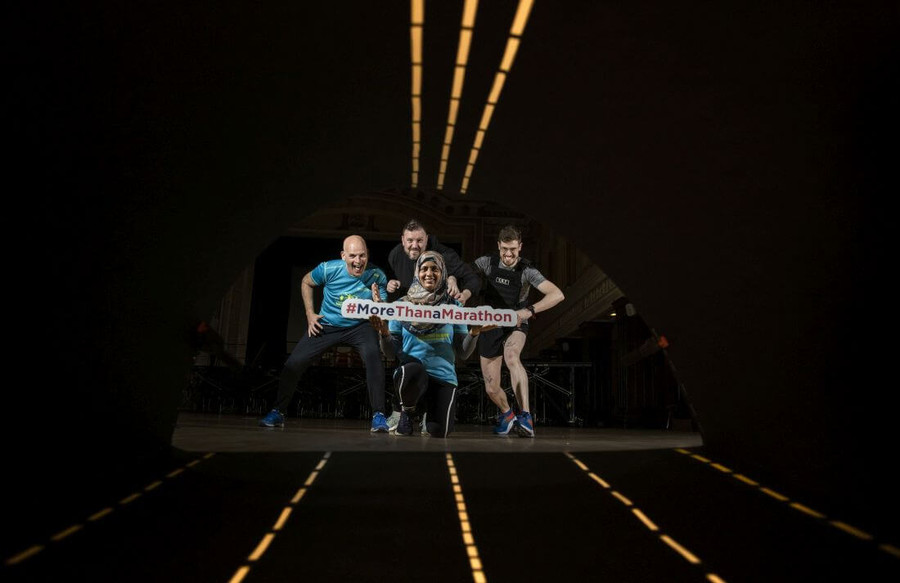 (Pre-COVID-19) Photo by photographer Cathal Noonan
(Pre-COVID-19) Photo by photographer Cathal Noonan
In a message to Cork Athletics PRO, Rebecca McEvoy, Cork City Marathon Organisers said:"As the list of cancelled events continues to grow due to covid-19 situation, The Cork City Marathon 2020 has brought a whole new meaning to their theme ‘more than a marathon’ where registered attendees are now being encouraged to run together, by running apart with their virtual race series starting this Sunday May 31 (the original date of the 2020 marathon) until September 6 (which had been the rescheduled date).
Announcing today, in the release below, that this year’s race is cancelled, registered participants can still take part in what is ‘more than a marathon’ with cumulative virtual runs kicking off this Sunday. The beauty is that they can choose when and where they do it during the dates.
The release below explains in more detail, but I’m sure everyone will find it’s a fantastic way to keep the community engaged and healthy, both physically and mentally, during this time."
Press Release
All is not lost for those who had registered to take part in the Cork City Marathon 2020. Now in its 14th consecutive year, the marathon is moving online for 2020 in an unprecedented approach for Cork City Council and the race organisers, as a direct response to the current climate. They made the difficult decision today, to cancel this year’s race which had been rescheduled to take place on September 6th.
Never has the marathon theme for the last number of years, ‘more than a marathon’, been more apt in that Cork City Council are calling on those who had registered to run for their chosen charities, to use the marathon’s virtual races as an opportunity to run together, by running apart, in whatever manner participants can with the current guidelines in place. All the while, supporters can continue to cheer on their friends and family across the Cork City Marathon social media channels.
The first virtual races will kick off this weekend on May 31st, during what would have been the official date for the marathon and will be ongoing throughout the summer until September 6th.
Speaking on Cork City Council’s plans, Adrienne Rodgers, Race Director of the Cork City Marathon 2020 said; “We have made the difficult decision to cancel this year’s event in the interest of the health and safety of our participants, volunteers and the thousands of Cork residents who have supported this great event over the last 13 years. The current restrictions on mass gatherings and activities only take us to August 10th, but cognisant of the existing advice, we don’t believe it would be possible to run the event safely in its current format in September.”
For those already registered for the 2020 marathon, all entries will be automatically deferred to the 2021 race, which will take place on the June Bank Holiday weekend – Sunday June 6th, 2021. Refunds are also available by emailing This email address is being protected from spambots. You need JavaScript enabled to view it.
While the Cork City Marathon will not go ahead on the streets of Cork this year, those who have registered for the 2020 race, are now being encouraged to instead, participate in what will be a series fun and engaging virtual marathon challenges where the focus will be on community spirit with a touch of competition.
Registered participants of the Cork City Marathon 2020 are encouraged to walk, jog, or run one of the five distance categories available through The Cork City Marathon virtual race website which goes live this Sunday May 31st. Participants can achieve their selected distance across a number of days or weeks within the race time period (safely and always following Government advice on Social Distancing). Their final accumulative race times can be submitted via an easy-to-use e-form which is available on the Cork City Marathon website. All the while, supporters can continue to cheer on their friends and family across social media.
“We are hopeful that everyone that had registered for 2020 will stay registered and will continue to show their amazing support for this race through the virtual races. We invite spectators who are not registered, to tune in to our social channels to cheer the registered participants on.
In 2021, we will be endeavouring to ensure that the Cork City Marathon will be the best yet while continuing to incorporate the virtual events.” Ms. Rodgers added.
2019 Cork City Marathon winner, current Irish 50K champion and Irish record holder Gary O’Hanlon has given the virtual races his full support and backing and tells us; “This is a brilliant initiative that I’m delighted to be involved with, it will add a longer life strand to the marathon and gives people the opportunity to continue to reach their target of running a marathon in an unprecedented but very manageable way. It’s going to sustain and grow the marathon community’s involvement while continuing to make it increasingly accessible to all.”
“I’m really looking forward to the virtual races and seeing the diversity synonymous with this marathon and the great human-interest stories that always emerge. Cork City Marathon has a special place in my heart, it really is more than a marathon, so I hope participants come out and support these virtual races across the summer,” he added.
Find out more information about the virtual events at www.corkcitymarathon.ie or follow the Cork City Marathon on Facebook and Instagram @corkcitymarathon or on Twitter @TheCorkMarathon #MoreThanAMarathon